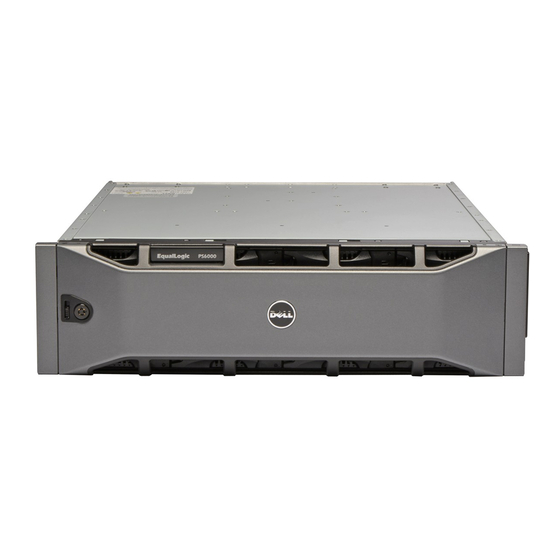Dell Equallogic PS6010xvs Manuel du matériel - Page 41
Parcourez en ligne ou téléchargez le pdf Manuel du matériel pour {nom_de_la_catégorie} Dell Equallogic PS6010xvs. Dell Equallogic PS6010xvs 50 pages. Equallogic ps series storage products
Également pour Dell Equallogic PS6010xvs : Vue d'ensemble (7 pages)

Volume Collections
NOTE: Do not use the Group Manager GUI to mount the clone of a clustered disk to a node in the same cluster.
A volume collection consists of one or more volumes from any pool and simplifies the creation of snapshots and
replicas. Volume collections are useful when you have multiple, related volumes. In a single operation, you can create
snapshots of the volumes (a snapshot collection) or replicas of the volumes (a replica collection).
Creating Volume Collections
To create a volume collection:
1.
Click Volume Collections → Create volume collection.
The Create Volume Collection – General window is displayed.
2.
Specify a name for the collection and an optional description.
3.
Click Next.
The Create Volume Collection – Components window is displayed.
4.
Select up to eight volumes for a collection. A volume collection can contain volumes from different pools.
5.
Click Next.
The Create Volume Collection – Summary window is displayed.
6.
If the configuration is correct, click Finish to create the volume collection.
7.
To make changes, click Back.
After creating a volume collection, you can create snapshots or replicas.
Thin Provisioning
You can use thin provisioning technology to provision the storage more efficiently, while still meeting application and
user storage needs. A thin-provisioned volume is initially allocated only a portion of the volume size. As data is written to
the volume, more space is automatically allocated (if available) from the free pool, and the volume reserve increases up
to the user-defined limit. If space is not available, the auto-grow operation fails. If in-use space, typically the volume
size, consumes all the volume reserve, the volume is set offline. Thin provisioning is not always appropriate or desirable
in an IT environment. It is most effectively used when you know how a volume grows over time, the growth is
predictable, and users do not need immediate, guaranteed access to the full volume size. Regular event messages are
generated as space is used, giving the administrator the opportunity to make adjustments, as needed. With thin-
provisioned volumes, you can utilize storage resources more efficiently, while eliminating the need to perform difficult
resize operations on the host.
Installation And Configuration Of A Failover Cluster
You can configure the operating system services on your Failover Cluster, after you have established the private and
public networks and have assigned the shared disks from the storage array(s) to the cluster nodes. The procedures to
configure the Failover Cluster are different and depends on the Windows Server operating system you use.
For more information on deploying your cluster with Windows Server 2003 operating systems, see the
Clusters with Microsoft Windows Server 2003 Installation and Troubleshooting Guide at support.dell.com/manuals.
For more information on deploying your cluster with Windows Server 2008 operating systems, see the
Clusters with Microsoft Windows Server 2008 Installation and Troubleshooting Guide at support.dell.com/manuals.
Dell Failover
Dell Failover
41
